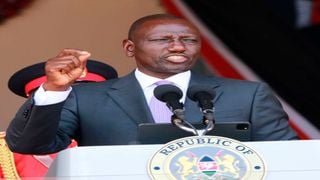
President William Ruto addresses wananchi during the 60th Madaraka Day national celebrations at Moi stadium in Embu on June 1, 2023.
| File | Nation Media GroupOur Columnists
Premium
Cry neutrality: At 60, Kenya is ripe to become ‘Africa’s Switzerland’
Over the past 60 years, Kenya has swung like a roller coaster between diplomatic neutrality and imprudent ideologically-driven alignment with rival superpowers.
But the war in Ukraine has turned a sharp spotlight on the concept of neutrality as a strategic tool for small states in the new Cold War in the 21st century characterised by heightened Sino-American geopolitical tensions.
With demand for its impartial role in regional and global conflict resolution increasing and its economy in free-fall, Kenya’s best option is to strategically and culturally re-position itself as the ‘Switzerland of Africa’, drawing on the grand ideals of impartiality and fairness to leverage its diplomatic, security and economic interests and bolter its status as a neutral actor, safe haven for investors and growth hub in an increasingly divided world.
As a “foreign policy principle whose purpose is the preservation of the independence and sovereignty of small states through non-participation and impartiality in international conflict,” neutrality has always been the mighty sword for feebler states like Kenya in global conflict.
During the Cold War, Kenya’s foreign policy was a perilous ride from virtuous neutrality to a virulent support of the West. In the era of national liberation (1945-1963), the architects of modern Kenya opted for neutrality.
Jomo Kenyatta was one of the organisers of the watershed 1945 Manchester Pan-African Congress, which adopted positive neutrality in global power politics as a cornerstone of liberation.
However, when the Mau Mau erupted on October 20, 1952, the British went on a diplomatic offensive to win Western powers and other Kenyan ethnic groups to the idea that the freedom fighters were the common enemy of both the West and the rest of Kenya.
According to Ugandan diplomatic historian, Godfrey Okoth, the US bought the British propaganda line, hook and sinker. The Dwight Eisenhower administration alleged that Mau Mau was “communist” inspired and a threat to US interests in the Indian Ocean.
Meanwhile, the heroism of the Mau Mau inspired other colonised parts of Africa and its diaspora, transforming Kenya into the Mecca of non-alignment. Under Gamal Abdel Nasser (1954-1970), Egypt saw the “Mau Mau” as ‘an African cause’ and used diplomatic and media campaign to support Kenya’s liberation. Fidel Castro named one of his Brigades the ‘Mau Mau’ in honour of the Kenyan freedom fighters who inspired Cuba’s revolutionary war.
In her insightful article, “Mau Mau are Angels…” Myles Osborne (2020) posits that Mau Mau offered an alternative pathway for marginalised Jamaicans to procure genuine freedom. The movement inspired Nelson Mandela to establish the Umkhonto We Sizwe (“Spear of the Nation”), the armed wing of South Africa’s anti-apartheid struggle.
All this changed after independence. Between 1963 and 1966, the US invested heavily in deradicalising Kenyan politics and putting the country on an even ideological keel as a staunch Western ally in Africa.
With the end of the Cold War and the on-set of the unipolar world, Kenya lost its shine in the eyes of USA and its allies. In Moi’s final decade, Mwai Kibaki’s and Uhuru Kenyatta’s , Kenya returned to strategic neutrality and adopted an assertive Africa-centred foreign policy.
This gave Nairobi access to investments, development assistance and markets in the emerging economic powerhouses, to reset its relations with traditional western partners, and to bolster its global influence. Neutrality paid off: an economic boom, ranking 4th in Africa in infrastructure development.
Recent high-profile diplomatic events have set off the conversation around Kenya’s neutrality. First, after the 2022 elections, Kenya’s neutrality has ended, thrusting the country firmly into the corner of the US-led Western bloc. It is déjà vu all over again.
For $100 million, Kenya will deploy 1,000 police officers and lead a multinational peacekeeping mission to Haiti; Support for Israel and condemnation of “the unprovoked attack by Hamas militants on the people of Israel” recently, not only clashed with the AU position but raised fears of possible ‘solidarity attacks’. Also, Kenya will host Britain’s King Charles III from October 31, the Monarch’s first trip to a Commonwealth country.
Second, during the 2022 campaign, Kenya experienced a raft of anti-China rhetoric. After the elections, relations with Kenya’s leading trade partner and creditor have improved but much is needed to restore mutual trust.
Third, despite Russian exports, Kenya skipped the second Russia–Africa Summit held in St. Petersburg in July, choosing, instead, “to be represented by the African Union”.
Fourth, Kenya has taken a lukewarm stance on the BRICS forum pioneered by Brazil, Russia, India, China and South Africa. Yet, other African powers — Ethiopia, Egypt and South Africa — embraced the bloc as an emerging frontier of growth and global power.
Neutrality will give Kenya a unique position to advocate for respect of multilateralism and rule-based international order and promote peace across the world.
- Prof Peter Kagwanja former Government Adviser (2007-13), and currently Chief Executive at the Africa Institute and Adjunct Professor at the University of Nairobi and National Defence University.





